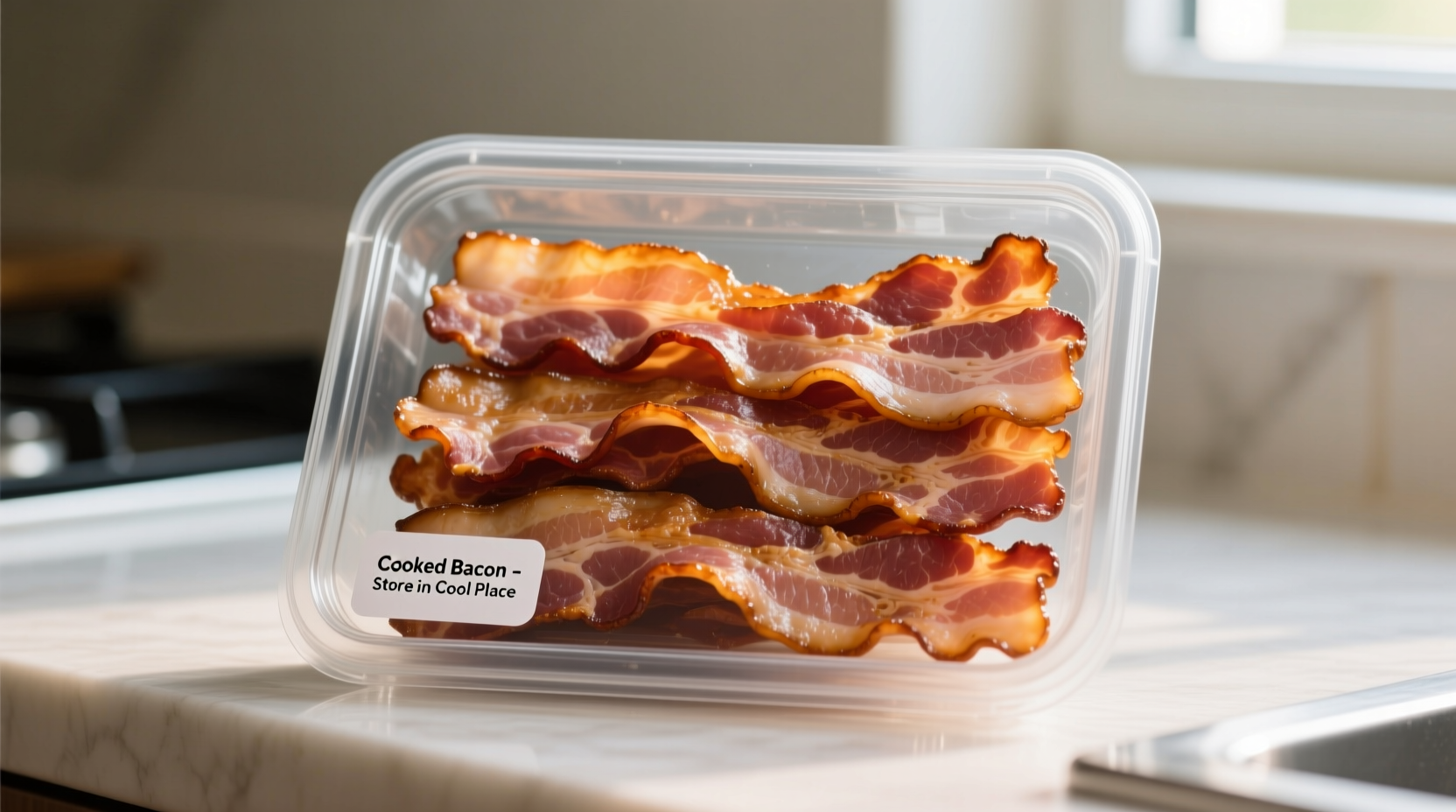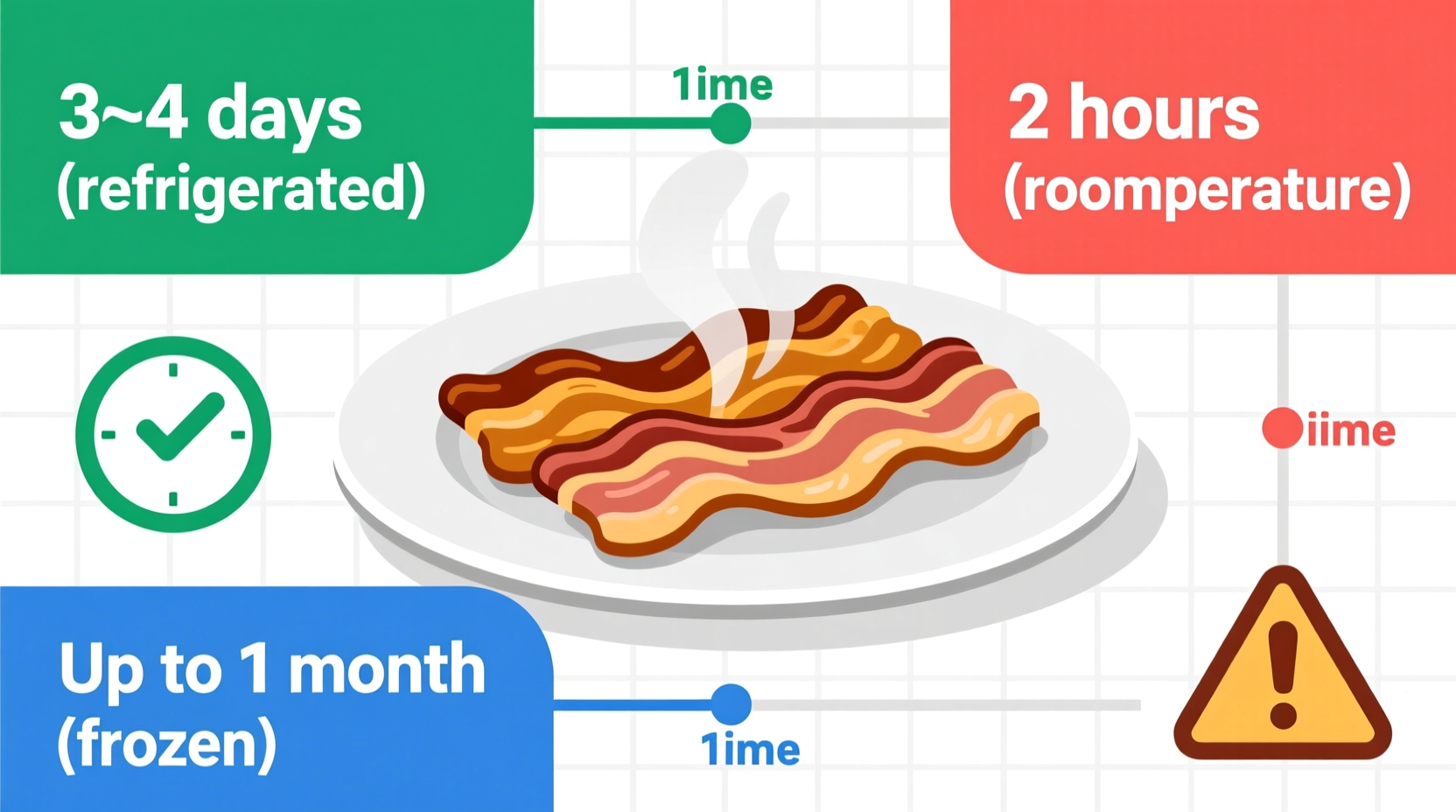Maximize Your Cooked Bacon's Freshness and Safety
Nothing beats the convenience of having perfectly cooked bacon ready to go for breakfast scrambles, salads, or sandwich toppings. But when you've cooked more than you need, understanding proper storage timelines becomes essential for both food safety and quality. Getting this wrong could lead to wasted food or, worse, foodborne illness.
Immediate Storage: The First Critical Hour
How you handle bacon immediately after cooking determines its entire storage lifespan. The USDA Food Safety and Inspection Service emphasizes that cooked foods should not remain in the temperature danger zone (40°F-140°F) for more than two hours. During summer months or in warm kitchens above 90°F, this window shrinks to just one hour.
For optimal results:
- Cool bacon quickly by spreading it in a single layer on a wire rack
- Never leave cooked bacon sitting on the counter while you finish other meal prep
- Refrigerate within 30 minutes for best quality retention

Refrigerator Storage Guidelines
When stored correctly in your refrigerator, cooked bacon maintains both safety and quality for a specific timeframe. The USDA recommends these storage durations based on extensive food safety research:
| Storage Method | Refrigerator (40°F or below) | Freezer (0°F or below) |
|---|---|---|
| Airtight container | 4-5 days | 1-2 months |
| Wrapped in foil | 3-4 days | 1 month |
| Wrapped in plastic wrap | 2-3 days | 3-4 weeks |
Notice the significant difference between storage methods? Airtight containers consistently outperform other methods by creating a moisture barrier that prevents both drying and bacterial growth. Glass containers with locking lids provide the best protection against odor transfer from other refrigerator contents.
Freezing Cooked Bacon: Long-Term Solutions
Freezing dramatically extends cooked bacon's shelf life while preserving quality. For best results:
- Arrange strips in single layers separated by parchment paper before freezing
- Vacuum sealing removes air that causes freezer burn
- Portion into meal-sized quantities for convenient thawing
- Label containers with date using freezer-safe markers
The Centers for Disease Control and Prevention confirms that properly frozen cooked bacon remains safe indefinitely, though quality peaks within 1-2 months. Beyond this timeframe, while still safe, you may notice texture degradation and flavor loss.
Spoilage Warning Signs You Can't Ignore
Even within recommended timeframes, always inspect cooked bacon before consuming. Trust your senses over calendar dates:
- Visual changes: Grayish-green discoloration or visible mold growth
- Texture issues: Slimy film or excessive stickiness
- Odor problems: Sour, fishy, or unpleasant rancid smell
- Taste warning: Off or sour flavor (only test if other signs aren't present)
When in doubt, throw it out. The USDA Food Safety and Inspection Service states that "when food looks or smells bad, toss it." No amount of reheating can eliminate certain bacterial toxins once they've formed.
Safe Reheating Practices
Proper reheating restores cooked bacon's crispness while ensuring food safety:
- Oven method: 375°F for 5-10 minutes on a wire rack over baking sheet
- Skillet approach: Medium heat for 2-3 minutes per side
- Microsecond solution: 20-30 seconds on paper towel
Regardless of method, always verify the internal temperature reaches 165°F using a food thermometer. This critical step eliminates any potential bacterial growth during storage. The FDA Food Code specifies this temperature as the minimum safe threshold for reheated cooked foods.
Practical Storage Hacks for Home Cooks
Professional kitchens use these techniques to maximize cooked bacon's shelf life:
- Store bacon grease separately for cooking applications
- Blot excess grease with paper towels before storage
- Include a folded paper towel in containers to absorb moisture
- Freeze bacon in broth for added flavor in future recipes
These methods address common problems home cooks face with stored cooked bacon—sogginess, flavor transfer, and texture degradation. By controlling moisture and preventing oxidation, you'll enjoy restaurant-quality results even with leftovers.
Frequently Asked Questions
Can you eat cooked bacon after 7 days in the refrigerator?
No, cooked bacon should not be consumed after 7 days in the refrigerator. The USDA recommends discarding cooked bacon after 4-5 days of refrigeration, even if stored properly. Bacterial growth can occur without visible signs, making extended storage unsafe.
What's the best way to store cooked bacon for meal prep?
For meal prep, portion cooked bacon into single-serving sizes in airtight glass containers with parchment paper between layers. This method maintains quality for 4-5 days in the refrigerator and allows for quick grab-and-go breakfasts or salad toppings without compromising food safety.
Does crispy bacon last longer than chewy bacon?
Yes, properly crisped bacon generally lasts longer than chewy bacon because the cooking process removes more moisture. Moisture creates an environment where bacteria can grow more easily. Fully crisp bacon stored correctly can maintain quality for the full 4-5 day refrigerator window.
Can you refreeze cooked bacon after thawing?
Yes, you can refreeze cooked bacon if it was thawed in the refrigerator and hasn't exceeded 3-4 days of refrigeration. However, each freeze-thaw cycle degrades texture quality. For best results, freeze in single portions to avoid repeated thawing of the entire batch.











 浙公网安备
33010002000092号
浙公网安备
33010002000092号 浙B2-20120091-4
浙B2-20120091-4